The disturbing and detailed reportage by a Pulitzer Prize winning journalist Seymour Hersh on Washington’s sabotage of the Russian Nordstream 2 gas pipeline to Germany now provides new perspective on the momentous series of geopolitical trends that began with the war in Ukraine.
My own assessment of the Russian invasion written one year ago offered an analysis that was, and still is, markedly at variance with the Washington-dominated narrative of the course of Ukraine events. See this.
A few thoughts from then:
- I condemned the Russian military invasion of Ukraine–and indeed of any government that launches a war (Bush’s invasion of Iraq included).
- My belief that the Russian invasion was nonetheless far from “unprovoked” but rather quite clearly provoked by Washington in its longstanding wilful insistence on pushing NATO’s armed alliance ultimately right up to the very borders of Russia–where ancient Kievan/Russian cultural roots are deeply linked with early Russian/Orthodox Slavic civilization. Yet Washington denies the validity of any Russian “sphere of influence” in Ukraine while the US itself still maintains its own strong sphere of influence throughout Latin America–witness the Cuban missile crisis. (And can you imagine a Chinese military base in Mexico to bolster Mexican sovereignty?)
- Russia repeatedly warned over the years that implacable NATO expansion into Ukraine was a real red line; knowledgeable American scholars and many former American ambassadors to Moscow consistently warned of those dangers. Yet their voices were ignored; even today calls for US strategic caution are outside of any discussion in Washington.
- In short, this was a war that never had to be.
- But whatever the pros and cons of NATO expansion , there is little doubt that Washington has triumphed in the information and “spin”battle in the Western media, hands down. Allmainstream media parrot the same Washington narrative–an extraordinary media unanimity in a supposedly “independent” Western press.
(It might be nice to believe that the near total unanimity of voices in the Western media is simply the result of ringing support for “democracy” in Ukraine. But might it be amiss to consider all this unanimity as part of the growing power of government-influenced corporate media to dominate the public agenda?
- I stated my belief last year that Russia would prevail in the war. I still believe that. But I did not foresee the degree to which the war would morph into a massive and growing confrontation between Western and Russian arms.
- The unprecedented sweeping vilification of Russia, of Putin personally, and Russian culture and arts in general had no parallel even during my long years at CIA during the Cold War–making peaceful resolution of this now “civilizational war” ever more distant.
- I even speculated that once the fighting settled on on the Ukraine battlefront that NATO would emerge, not strengthened, but weakened and more divided reflecting deepening European doubts about the wisdom for Europe in following Washington into dangerous and costly wars in pursuit of American self-perceived strategic interests. I believe Europe will come to experience deep buyers’ regret over Washington’s risky policies, but I am far less confident now, for reasons below.

NATO’S April 2008 summit in Bucharest, Romania, where Ukraine’s “aspirations to join NATO” were formally welcomed. (Archive of the Chancellery of the President of the Republic of Poland, Wikimedia Commons)
The Nordstream Sabotage Watershed
The stunning recent and detailed reportage of direct American sabotage of the Nordstream 2 gas pipeline represents a major geostrategic watershed in two senses: First, the implications of Washington’s act of war with disastrous economic impact upon Europe will not subside easily. But more importantly this event has demonstrated America’s successful cowing of any public commentary on the event–across US media but moreso across all European media itself, including in the most economically victimised state–Germany. We observe stunning, nearly inexplicable silence over this major international event.
And Russia has gotten the message–American policies and statements have deeply reinforced Russia’s long-standing belief that the West is implacably hostile to any Russian role in the West–going back to the bitter and irrevocable split of Christendom between Rome and the Eastern Orthodox Church in 1054. That was later followed up by two devastating European invasions of Russia (Napoleon and Hitler).
Growing European trade ties–especially Germany– with Russia since the end of the Cold War have been thrown on the trash heap by NATO expansion east. The hostility of East-West relations have been reinforced and deepened. Washington has no desire to work out a new common-European security policy that includes Russian interests as well. And these US policies have now helped ensure that Russia’s future now firmly lies in the East–Vladivostok and with China in a shared rejection of US global hegemony.
The New East-West Great Wall
The rise of a new Great Wall that blocks off Russia from Western Europe is one of the most striking outcomes of this war: European officialdom seems to have cast in its lot, perhaps reluctantly but irrevocably, with the American strategic goals in the world. Those goals now even speak of creating a new “NATO Pacific” designed to challenge Chinese power economically and strategically in China’s own backyard–at great potential economic cost to Europe.
But for all this demonstration of Washington’s hold over Europe, it is also striking to note how the great majority of the world has indeed not gone along with US strategic ambitions to weaken and humble Russia or to impose Washington’s own geopolitical architecture on most of the rest of the world. Broadly speaking Latin America, the Middle East, and Africa do not perceive their strategic interests as aligning with Washington’s. Apart from some lip service criticism of Russia, few states including large segments of Asia and India itself have imposed any meaningful sanctions against Russia. More vividly, we see the emergence of new non-western alliances such as the BRICS (Brazil, Russia, India, China, South Africa) with many other major states lining up to include Turkey, Iran and Saudi Arabia. These states of the Global South are also developing plans for new international reserve currency designed to undercut the ability of Washington to dictate international policy through US dollar-based sanctions.
Redefining Eurasia
A new Eurasia is rising, driven by the bold and geopolitically visionary Chinese Belt and Road Initiative. But just what is this new Eurasia now? With a new Great Wall between Russia and the West, where now is the “Euro” in Eur-asia? Europe ceases to be even at the tail end of “Eurasia,” potentially cut off physically from the Belt and Road that runs through Russia and much of the Global South. Europe may have to find its way strategically and economically elsewhere in the world. For Washington that’s just fine; the US will consistently seek to constrain ties of other countries with Russia or China.

NATO defense ministers meet at the military alliance’s headquarters in Brussels on Feb. 15. (DoD, Chad J. McNeeley)
The stunning silence of US and European media reportage on the sabotage of the Nordstream pipeline sadly represents a clear sign that Europe frankly lacks the courage or vision to pursue a policy independent of Washington’s strategic game plan. Washington’s power so far has heavily constrained Europe’s global ties, and intensified Washington’s dominance over Europe politically, economically and above all psychologically. It is hard to see how Europe will be able to extract itself from this restrictive American embrace to become a constructive and needed independent player on the international scene.
Image: Eurasia, orthographic projection. (Keepscases, CC BY-SA 3.0, Wikimedia Commons)

Indeed America itself seems sadly to have lost any kind of positive vision in how to deal with the rest of the world. The essence of American foreign policy now is almost entirely negative: block Russia, block China, and prevent their development and expansion of their international reach. This does not present a very inviting menu of positive policy options for most of the rest of the world–a world that seeks to avoid costly involvement in Western wars, and to pursue their own economic development. They show signs now of visceral negative reactions to the perpetuation of Western ex-colonial powers seeking to impose their own stale geopolitical and economic agendas on the rest of the world.
This is the reality of the outcome of the war in Ukraine. Washington seems determined to pursue its increasingly illusory goal of maintaining international hegemony, now packaged in spurious claims of supporting “democracy versus authoritarianism.” Not many buyers there. How long will the US continue to flail in endless foreign wars to desperately prove to itself and the world that it is still # 1?
*
Note to readers: Please click the share buttons above. Follow us on Instagram and Twitter and subscribe to our Telegram Channel. Feel free to repost and share widely Global Research articles.
Graham E. Fuller is a fluent Russian speaker, former CIA operations officer and former vice-chair of the National Intelligence Council at CIA for long term forecasting.
Featured image: China’s embassy in Berlin, January 2010. (Jochen Teufel, CC BY-SA 3.0, Wikimedia Commons)



The disturbing and detailed reportage by a Pulitzer Prize winning journalist Seymour Hersh on Washington’s sabotage of the Russian Nordstream 2 gas pipeline to Germany now provides new perspective on the momentous series of geopolitical trends that began with the war in Ukraine.
My own assessment of the Russian invasion written one year ago offered an analysis that was, and still is, markedly at variance with the Washington-dominated narrative of the course of Ukraine events. See this.
A few thoughts from then:
(It might be nice to believe that the near total unanimity of voices in the Western media is simply the result of ringing support for “democracy” in Ukraine. But might it be amiss to consider all this unanimity as part of the growing power of government-influenced corporate media to dominate the public agenda?
NATO’S April 2008 summit in Bucharest, Romania, where Ukraine’s “aspirations to join NATO” were formally welcomed. (Archive of the Chancellery of the President of the Republic of Poland, Wikimedia Commons)
The Nordstream Sabotage Watershed
The stunning recent and detailed reportage of direct American sabotage of the Nordstream 2 gas pipeline represents a major geostrategic watershed in two senses: First, the implications of Washington’s act of war with disastrous economic impact upon Europe will not subside easily. But more importantly this event has demonstrated America’s successful cowing of any public commentary on the event–across US media but moreso across all European media itself, including in the most economically victimised state–Germany. We observe stunning, nearly inexplicable silence over this major international event.
And Russia has gotten the message–American policies and statements have deeply reinforced Russia’s long-standing belief that the West is implacably hostile to any Russian role in the West–going back to the bitter and irrevocable split of Christendom between Rome and the Eastern Orthodox Church in 1054. That was later followed up by two devastating European invasions of Russia (Napoleon and Hitler).
Growing European trade ties–especially Germany– with Russia since the end of the Cold War have been thrown on the trash heap by NATO expansion east. The hostility of East-West relations have been reinforced and deepened. Washington has no desire to work out a new common-European security policy that includes Russian interests as well. And these US policies have now helped ensure that Russia’s future now firmly lies in the East–Vladivostok and with China in a shared rejection of US global hegemony.
The New East-West Great Wall
The rise of a new Great Wall that blocks off Russia from Western Europe is one of the most striking outcomes of this war: European officialdom seems to have cast in its lot, perhaps reluctantly but irrevocably, with the American strategic goals in the world. Those goals now even speak of creating a new “NATO Pacific” designed to challenge Chinese power economically and strategically in China’s own backyard–at great potential economic cost to Europe.
But for all this demonstration of Washington’s hold over Europe, it is also striking to note how the great majority of the world has indeed not gone along with US strategic ambitions to weaken and humble Russia or to impose Washington’s own geopolitical architecture on most of the rest of the world. Broadly speaking Latin America, the Middle East, and Africa do not perceive their strategic interests as aligning with Washington’s. Apart from some lip service criticism of Russia, few states including large segments of Asia and India itself have imposed any meaningful sanctions against Russia. More vividly, we see the emergence of new non-western alliances such as the BRICS (Brazil, Russia, India, China, South Africa) with many other major states lining up to include Turkey, Iran and Saudi Arabia. These states of the Global South are also developing plans for new international reserve currency designed to undercut the ability of Washington to dictate international policy through US dollar-based sanctions.
Redefining Eurasia
A new Eurasia is rising, driven by the bold and geopolitically visionary Chinese Belt and Road Initiative. But just what is this new Eurasia now? With a new Great Wall between Russia and the West, where now is the “Euro” in Eur-asia? Europe ceases to be even at the tail end of “Eurasia,” potentially cut off physically from the Belt and Road that runs through Russia and much of the Global South. Europe may have to find its way strategically and economically elsewhere in the world. For Washington that’s just fine; the US will consistently seek to constrain ties of other countries with Russia or China.
NATO defense ministers meet at the military alliance’s headquarters in Brussels on Feb. 15. (DoD, Chad J. McNeeley)
The stunning silence of US and European media reportage on the sabotage of the Nordstream pipeline sadly represents a clear sign that Europe frankly lacks the courage or vision to pursue a policy independent of Washington’s strategic game plan. Washington’s power so far has heavily constrained Europe’s global ties, and intensified Washington’s dominance over Europe politically, economically and above all psychologically. It is hard to see how Europe will be able to extract itself from this restrictive American embrace to become a constructive and needed independent player on the international scene.
Image: Eurasia, orthographic projection. (Keepscases, CC BY-SA 3.0, Wikimedia Commons)
Indeed America itself seems sadly to have lost any kind of positive vision in how to deal with the rest of the world. The essence of American foreign policy now is almost entirely negative: block Russia, block China, and prevent their development and expansion of their international reach. This does not present a very inviting menu of positive policy options for most of the rest of the world–a world that seeks to avoid costly involvement in Western wars, and to pursue their own economic development. They show signs now of visceral negative reactions to the perpetuation of Western ex-colonial powers seeking to impose their own stale geopolitical and economic agendas on the rest of the world.
This is the reality of the outcome of the war in Ukraine. Washington seems determined to pursue its increasingly illusory goal of maintaining international hegemony, now packaged in spurious claims of supporting “democracy versus authoritarianism.” Not many buyers there. How long will the US continue to flail in endless foreign wars to desperately prove to itself and the world that it is still # 1?
*
Note to readers: Please click the share buttons above. Follow us on Instagram and Twitter and subscribe to our Telegram Channel. Feel free to repost and share widely Global Research articles.
Graham E. Fuller is a fluent Russian speaker, former CIA operations officer and former vice-chair of the National Intelligence Council at CIA for long term forecasting.
Featured image: China’s embassy in Berlin, January 2010. (Jochen Teufel, CC BY-SA 3.0, Wikimedia Commons)